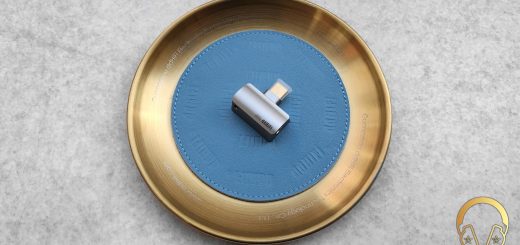iBasso DC04 USB DAC Review
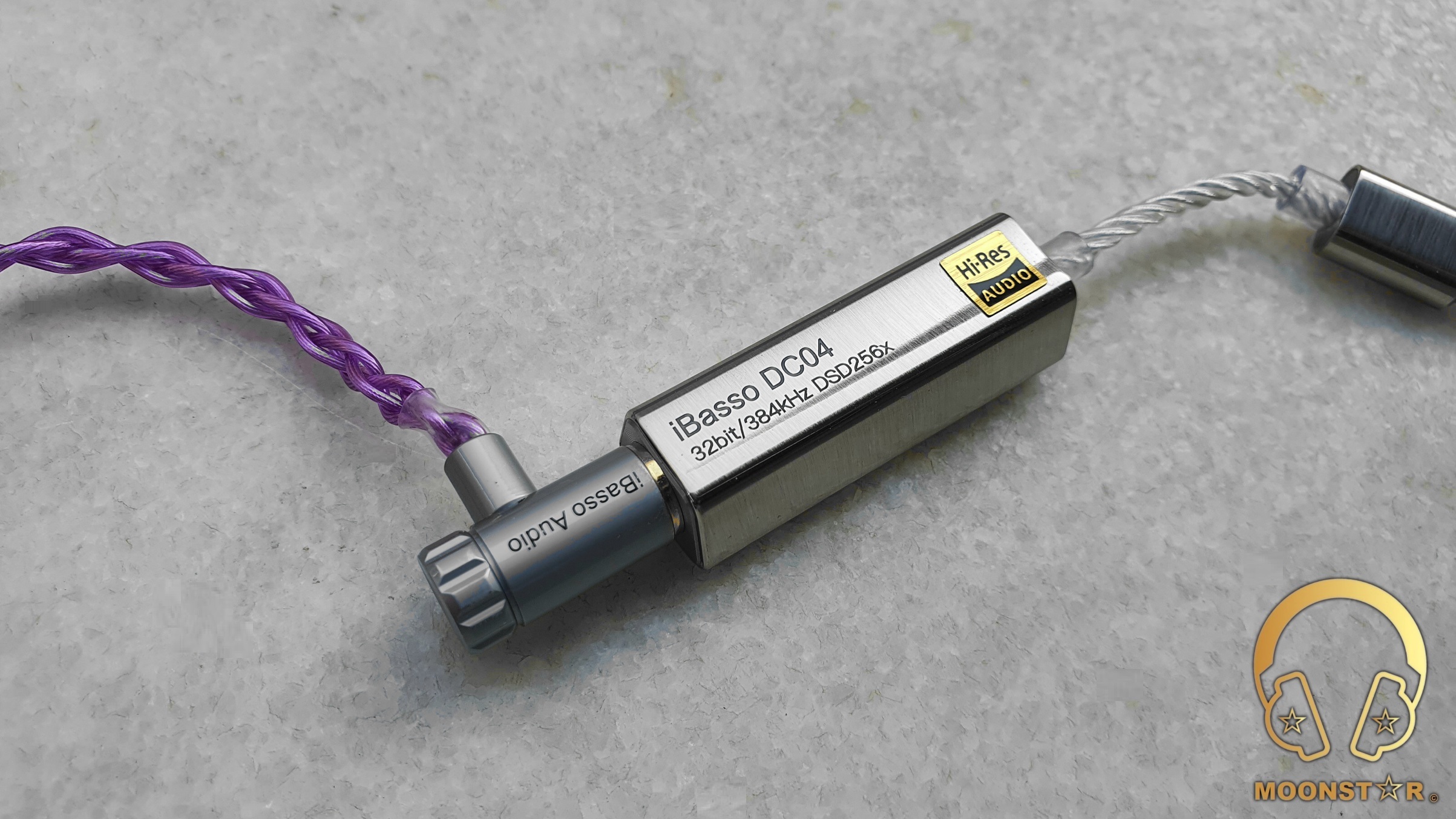
iBasso DC04 Hi-Res DAC/Amplifier Dongle Review
Introduction:
iBasso is Chinese company that is specialized in the Portable Audio products such like Digital Audio Players (DAP), Portable Amplifiers, In-Ear Monitors, Headphones, etc.
- iBasso Webpage: https://ibasso.com/
The iBasso DC04 is an ultra portable USB DAC/Amplifier Dongle with 4.4mm Balanced (TRRRS – Pentaconn) output that was released together with the DC03, which is the 3.5mm Single Ended output variant of the New USB DAC Series. The DC04 offers a 4-channel true balanced output with an impressive powerful output of approx 195mW@32Ω and comes with the 2x Cirrus Logic CS43131 DAC Chips.

Disclaimer:
I would like to thank iBasso for providing me the DC04 USB DAC/Amplifier Dongle as review sample. I am not affiliated with iBasso beyond this review and these words reflect my true and unaltered opinions about the product!
Price & Availability:
The actual MSRP price of the iBasso DC04 is about $74.99 USD. More information’s can be found under the link below;
Package and Accessories:
The iBasso DC04 came in a small transparent hard plastic box with some product related brandings o the top and information’s at the bottom.

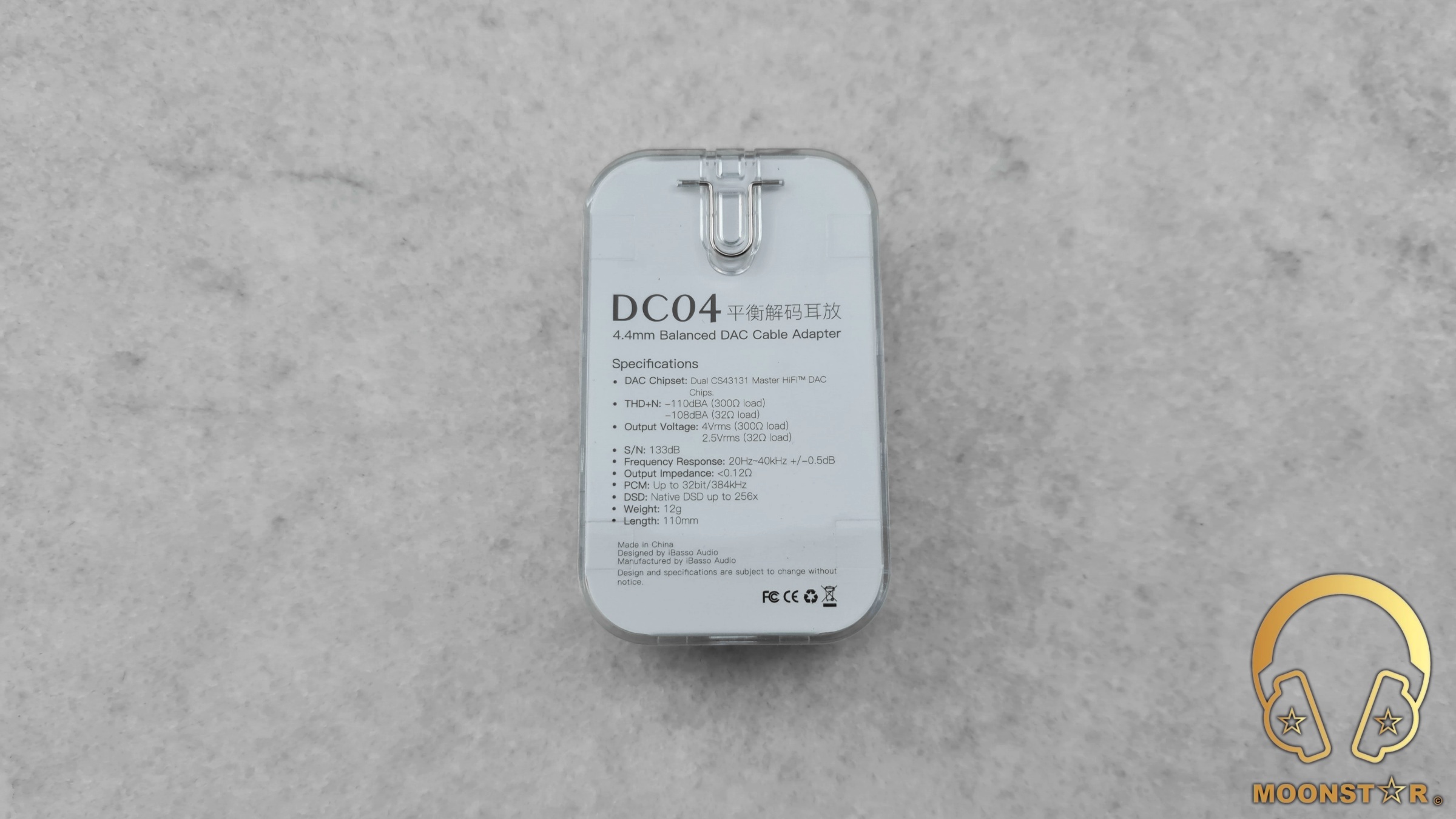
Inside the box are the following contents & accessories;
- 1 x iBasso DC04 Ultra Portable USB DAC/Amplifier Dongle
- 1 x USB Type-C to USB A Adaptor
Design and Build Quality:
The iBasso DC04 is an ultra portable USB DAC/Amplifier dongle with very robust build quality that looks and feels very premium. It has a total length of about 11mm and weight only 12grams.

The dongle shows a combination of 3 main components, the USB Type-C connector, the low profile braided cable and the main body, which is the heart of the device.

The main body features all the important internals like such like the DAC, PCB, 4.4mm Output, etc.

The main body has a metal housing that is available in two different color options that are black and the one in silver same like my review unit.
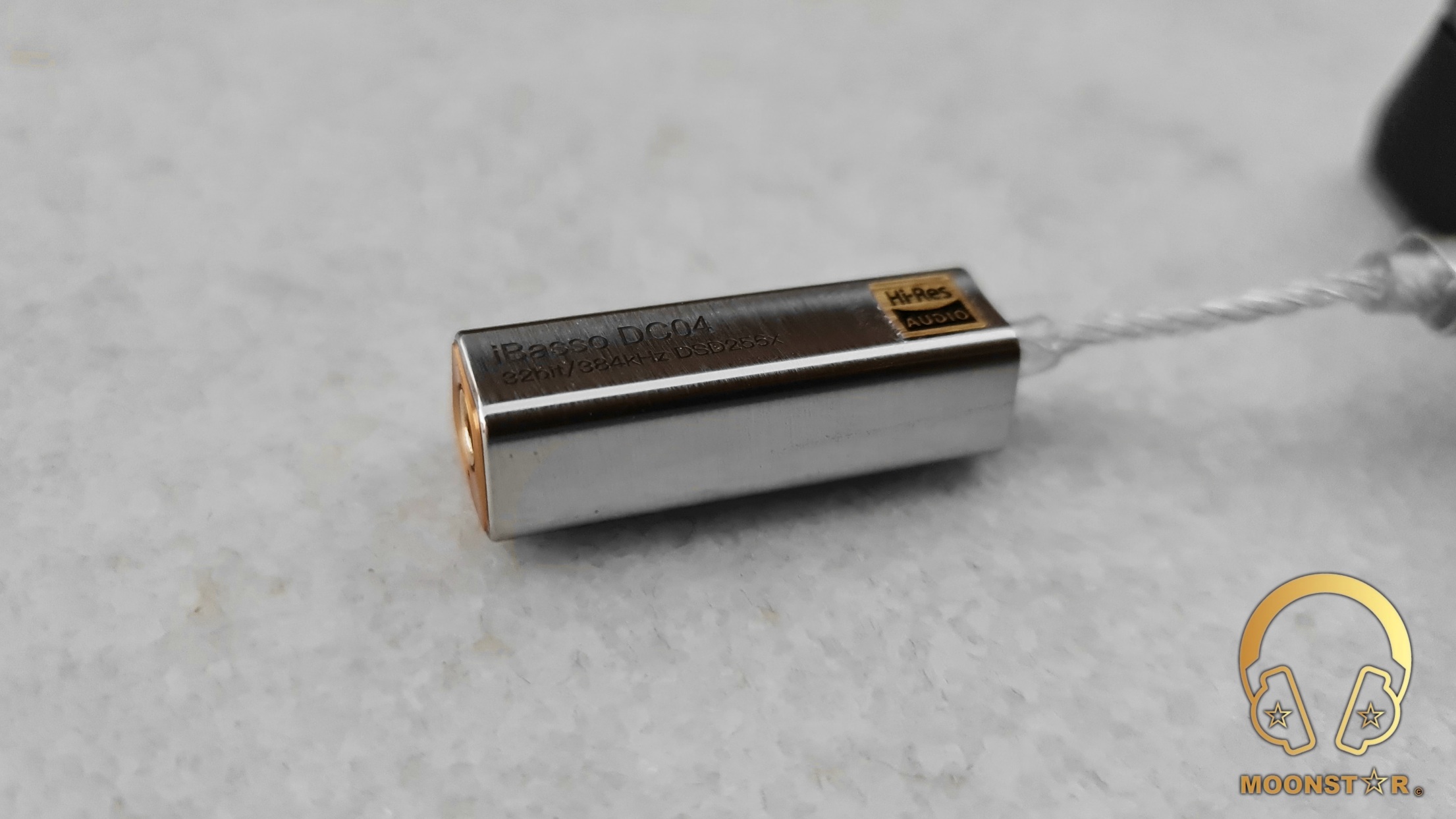
On the front of the main body is the 4.4mm TRRRS Balanced output and an LED light indictor that lights up when the device is in operation.
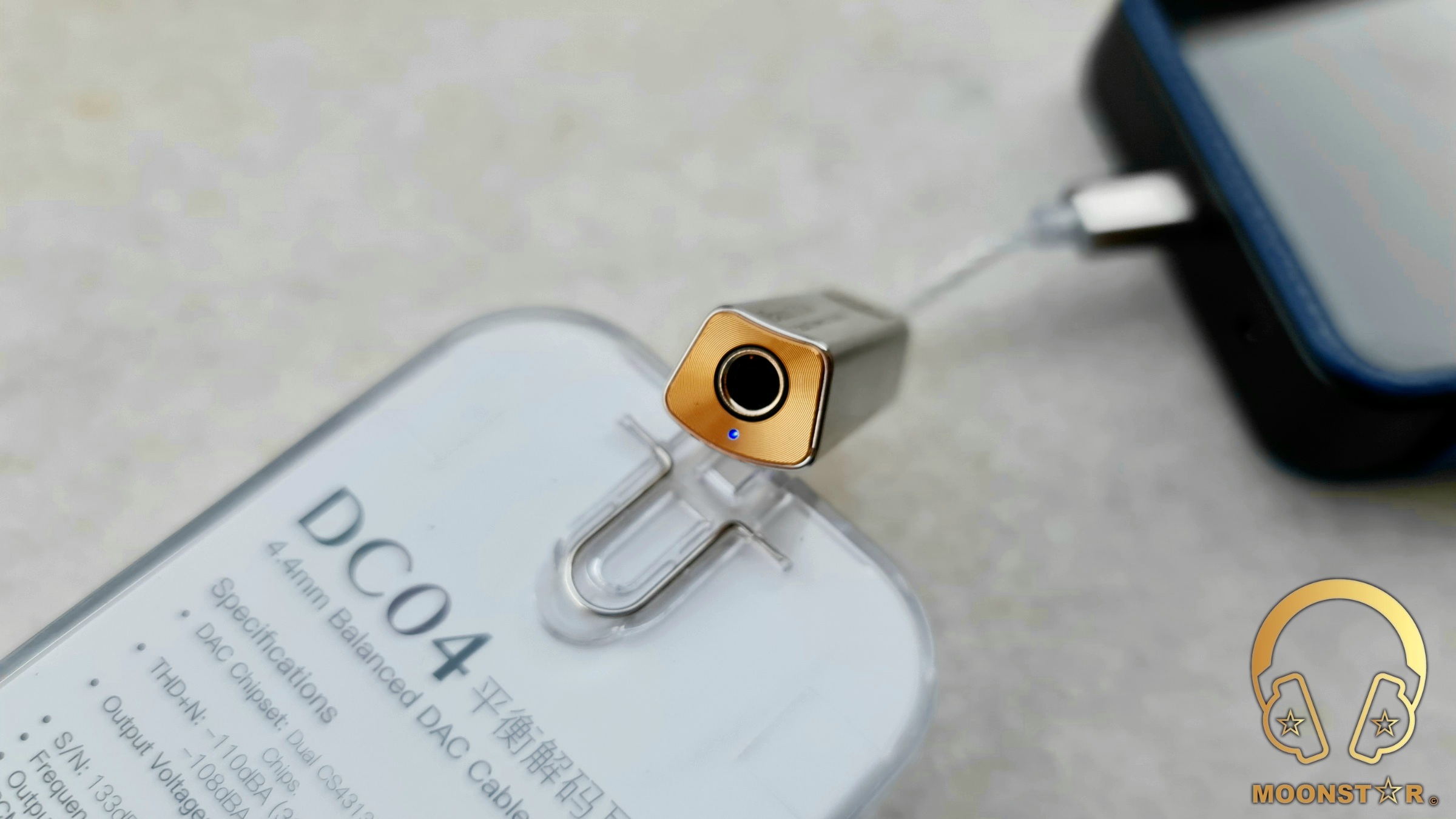
On the top of the main body is the iBasso DC04 & 32bit/384kHz DSD256x branding in white color and the Hi-Res Audio sticker.
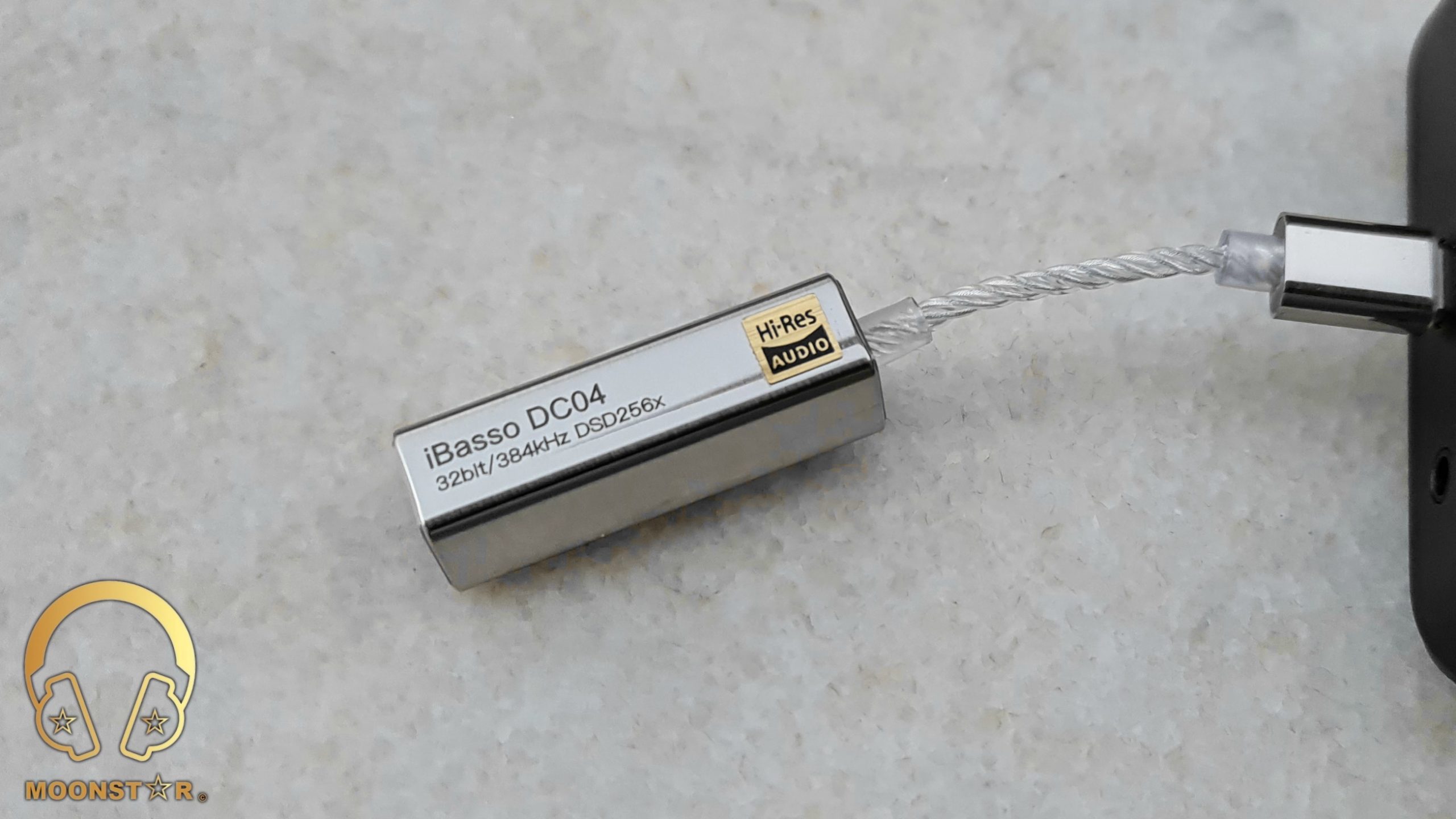
The backside of the housing is blank.
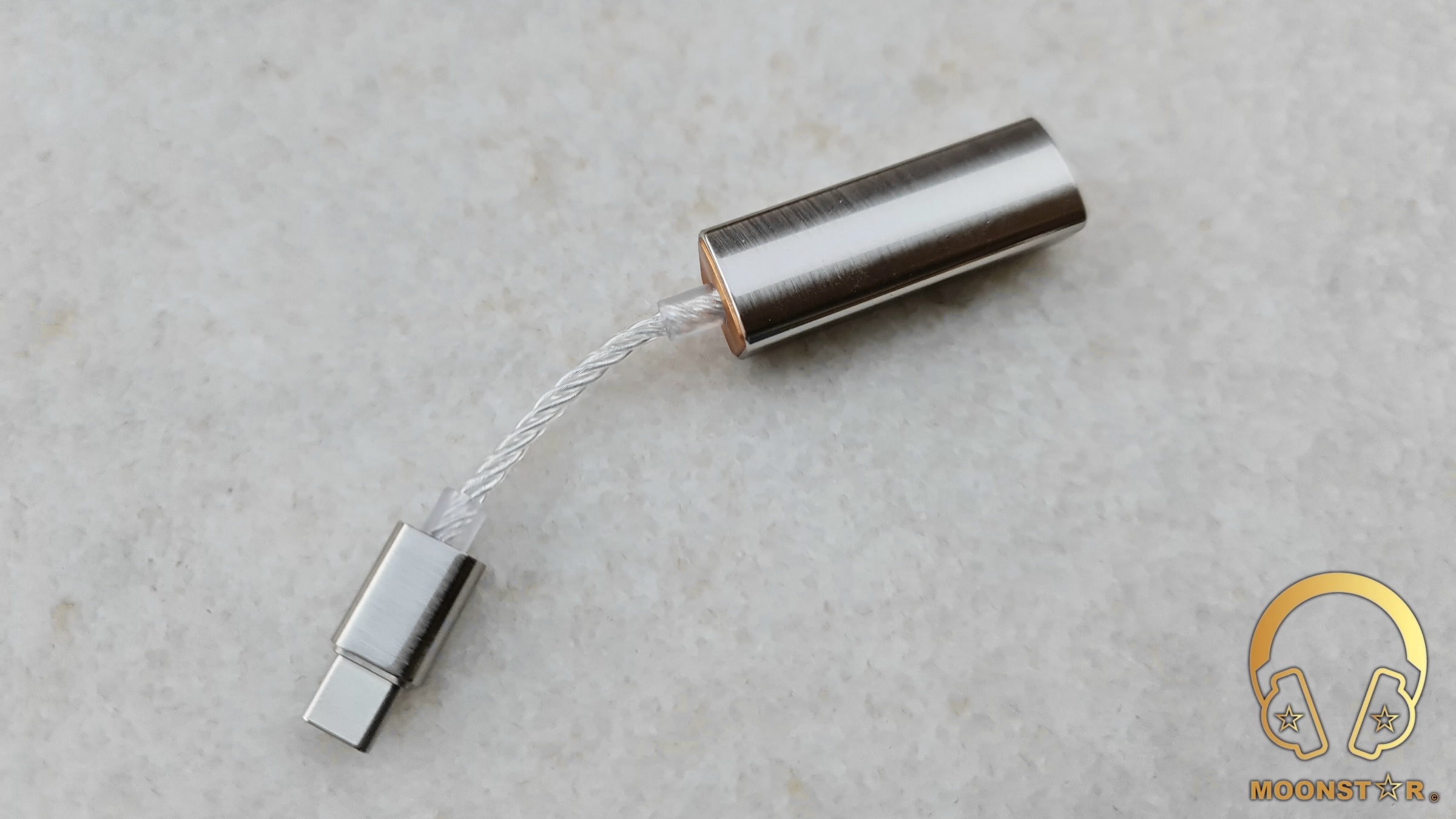
The low profile cable has a nice braided design and is made of 4 Core Silver Plated Copper wire material. It is fixed to the main body with a transparent plastic strain relief that offers extra durability.
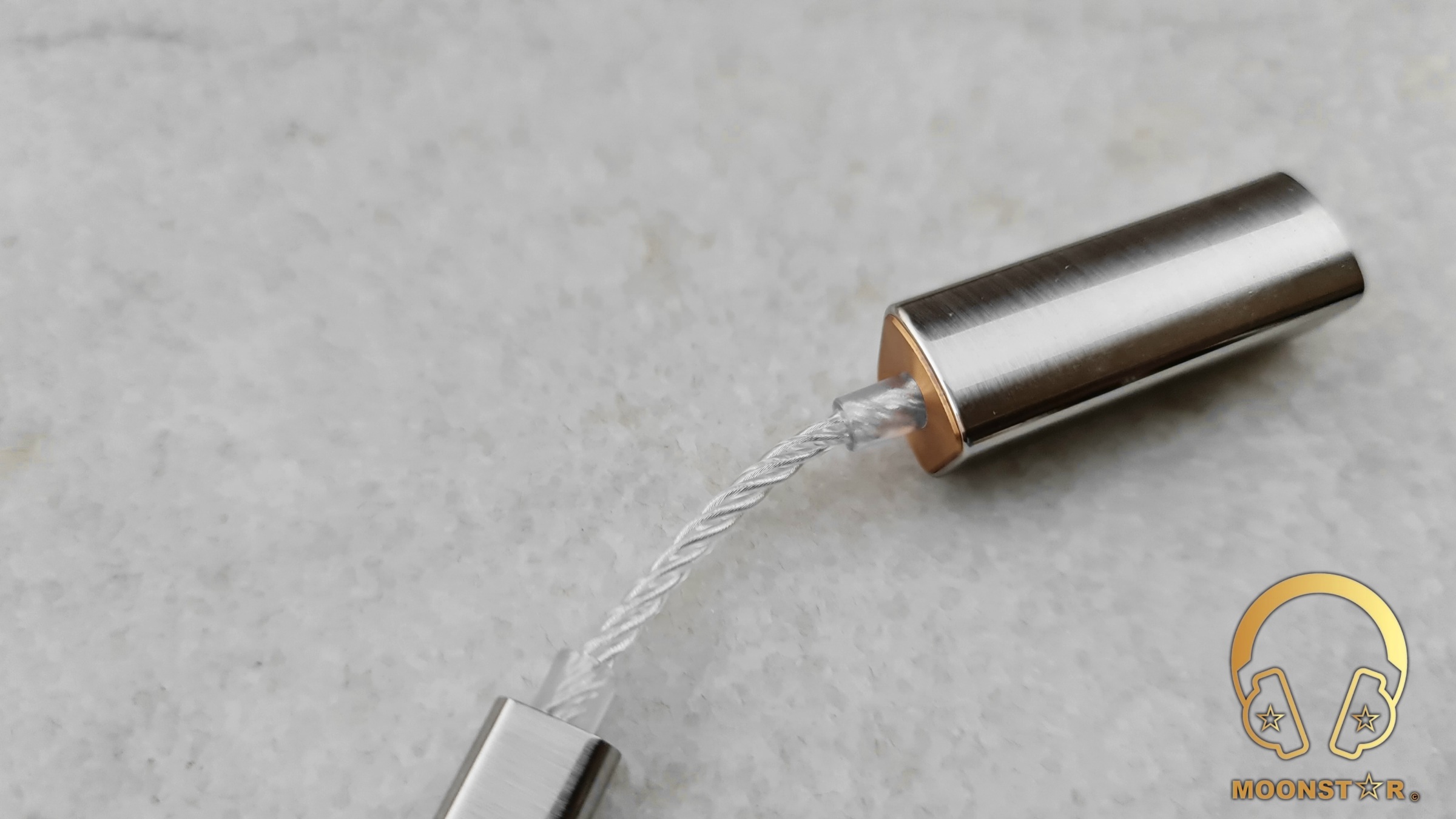
The USB Type-C connector has also the metal housing in silver color and features also a transparent plastic strain relief.
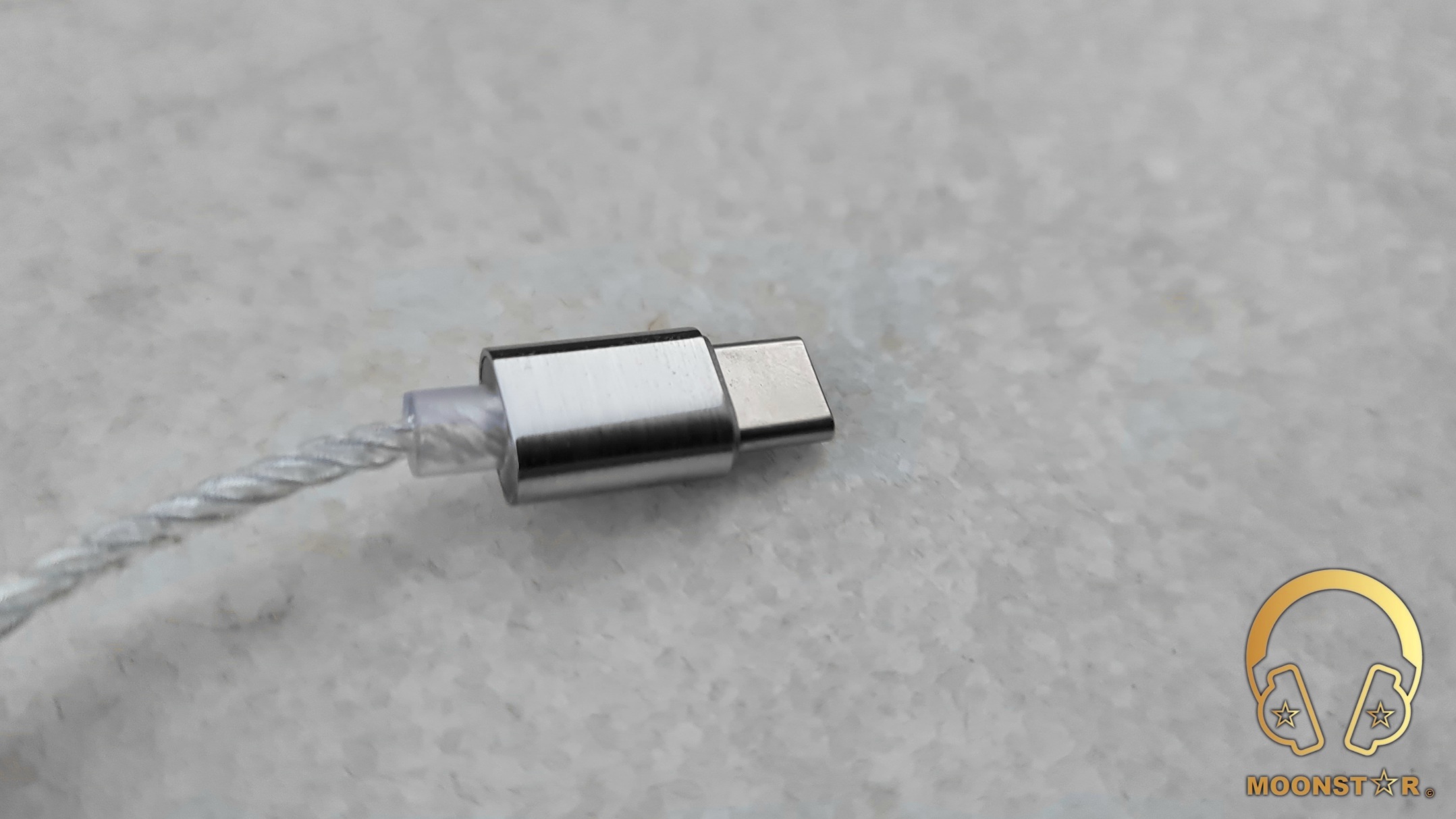
The overall build quality of the DC04 is just fantastic, especially for a device below the $80,00 USD price tag.
Technical Specifications:
- DAC chip : CS43131*2
- THD+N : -110dB/0.00032%(300Ω load), -108dB/0.00039%(32Ω load)
- Output level : 4Vrms(300Ω load) 2.5Vrms(32Ω load)
- Output power : 195mW@32Ω,
- SNR : 133dB
- Frequency response : 20Hz-40kHz±0.5dB
- Background noise : 0.9 μV
- Output impedance : ﹤0.12Ω
- PCM : up to 32Bit/384kHz
- DSD : Native DSD64, DSD128, DSD256
- Weight : 12g
- Length : 110mm
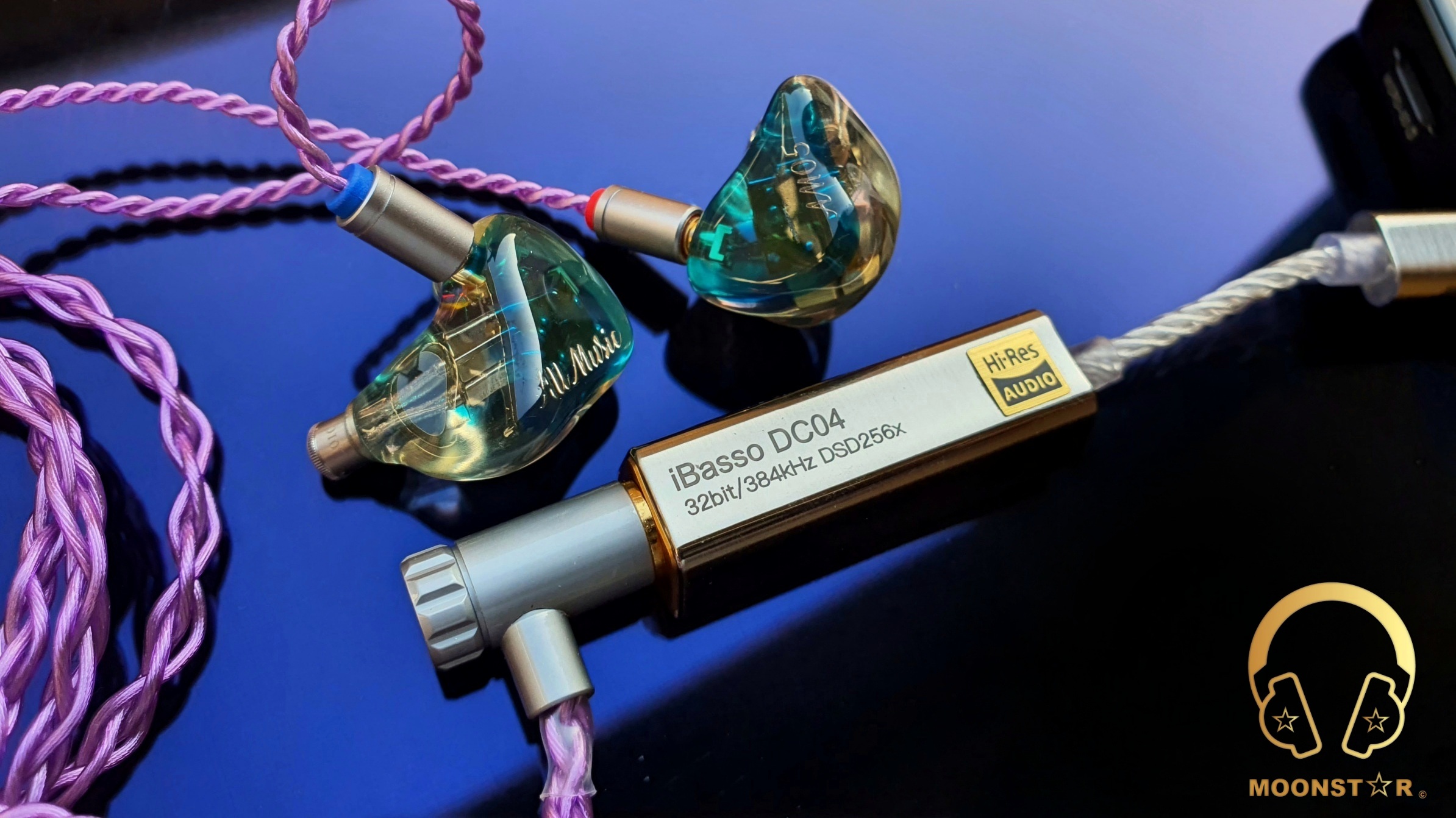
Hardware & Software Features:
a) DAC (Digital to Analog Converter):
The iBasso DC04 is equipped with two Cirrus Logic CS43131 high-performance DAC (Digital to Analog Converter) chips to build a 4-channel true balanced output line, which can significantly improve the resolution and channel separation, and present rich sound details. The CS43131 comes with Cirrus Logic’s next generation MasterHIFI™ technology for a better sound performance with lower power consumptions. The DC04 has a THD + N of about < 0.00032% (-110dB).
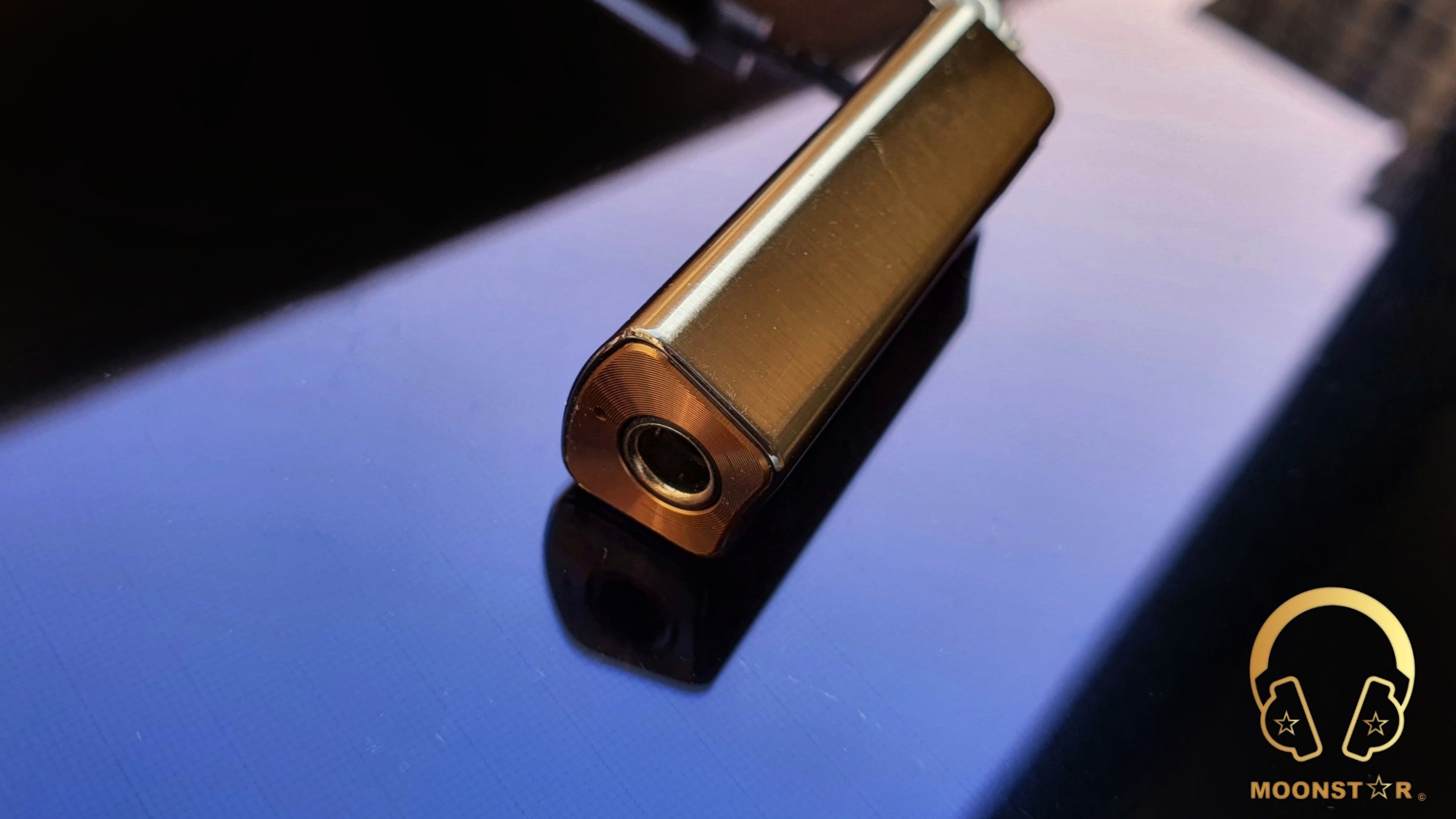
b) Supported Sampling Rates:
The iBasso DC04 support sampling rates from 16, 24, 32Bit, 44.1, 48, 88.2, 96, 176.4, 192, 352.8, 384kHz up to Native DSD 256x.
c) Connectivity:
The iBasso DC04 uses a USB-C connector and utilizes the standard UAC2.0 USB receiver. It is compatible with most Android Smartphones and tablets on the market and can also be connected to MAC and Windows PC’s via the supplied USB Type-C to USB-A converter, which allows it to work as a USB Soundcard.
The iBasso DC04 uses a standard UAC 2.0 sound card chipset for plug-and-play on Mac and Win10 computers. For WinXP, Win7, and Win8 systems please download the driver from the link below;
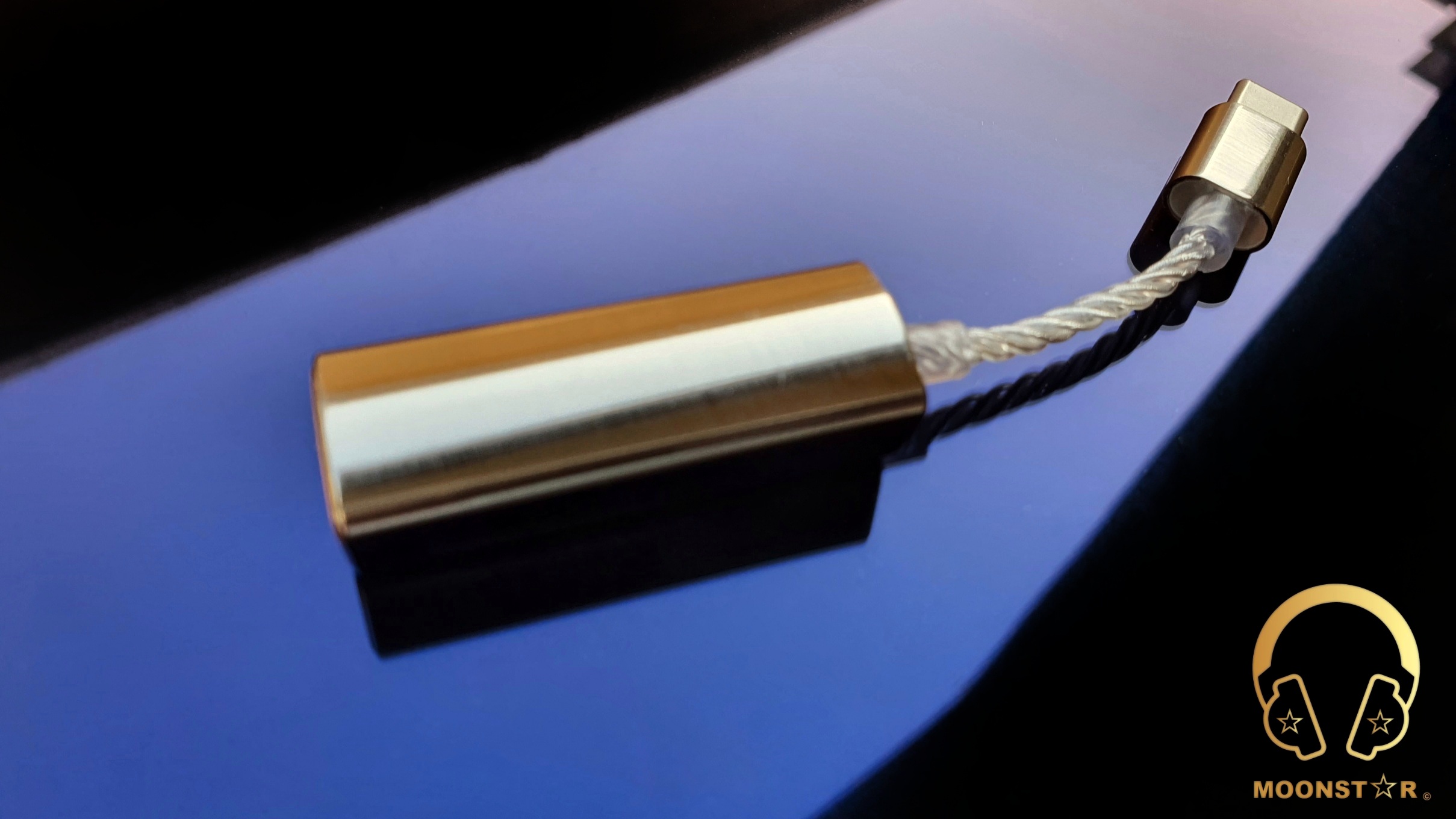
d) Amplification & Background Noise:
The iBasso DC04 uses a true balanced circuit to create a true balanced amplifier to provide a high output power with improved dynamics and resolution.
The DC04 offers plenty of power for such a small USB DAC/Amplifier that is able to deliver 195mW @ 32Ω, which is quite impressive. The output impedance of the DC04 is just 0.12Ω that makes it highly compatible with sensitive In-Ear Monitors.
The DC04 offers a great performance in terms of background noise, even with very sensitive IEM’s. The rated background noise is approx < 0.9μV, which is almost inaudible.
e) Software:
The iBasso exclusive APK applications offer a 64 level hardware volume adjustment. Mobile phones usually use software algorithms to adjust the volume, which are only about 10 levels in general. All software’s & divers are available under the link below;
Equipments used for this review:
- DAC’s : iBasso DC04, Musiland MU2
- USB Source : Samsung Galaxy Note10 Plus, Asus TUF FX505DU
- IEM’s : iBsso AM05, iBasso IT01s
- Headphones : iBasso SR02, Sivga Phoenix
Albums & tracks used for this review:
- Hayley Westenra – Odyssey Album (Dezzer HiFi)
- Dionne Warwick – Walk On By (Flac 16bit/44.1kHz)
- Sarah McLachlan – Angel (Flac 24bit/48kHz)
- Sertap Erener – Aşk (Flac 16bit/44.1kHz)
- Edith Piaf – Non Je Ne Regrette Rien (Flac 16bit/44.1kHz)
- Diana Krall – So Wonderful (DSF)
- Aretha Franklin – I Say A Little Payer (Flac 24bit/96kHz)
- David Bowie – Heroes (Flac 24bit/192kHz)
- Barry White – Just The Way You Are (Flac 24bit/48kHz)
- Isaac Hayes – Walk On By (Flac 16bit/44.1kHz)
- Sting – Englishman in New York – (Flac 24bit/48kHz)
- Eric Clapton – Wonderful Tonight (Flac 24bit/96kHz)
- U2 – Sunday Bloody Sunday (Flac 16bit/44.1kHz)
- Portishead – It Could Be Sweet (Spotify)
- Charly Antolini – Duwadjuwandadu (Flac 24bit/192kHz)
- Chopin – Nocturn No. 20 In C-Sharp Minor (Flac 16bit/44.1kHz)
- Fazıl Say – Nazım Oratoryosu (Live) (Flac 16bit/44.1kHz)
- Vivaldi – Le QuarttroStagioni “The Four Season” (Deezer HiFi)
- Otto Liebert& Luna Negra – The River (Flac 24bit/192kHz)
- Bro Safari, UFO! – Drama “Party Favor Remix” (Deezer HiFi)
- Toutant – Rebirth (Deezer HiFi)
- Armin Van Buuren – Vini Vici (Deezer HiFi)
- Really Slow Motion – Deadwood (Deezer HiFi)
- Jo Blankenburg – The Magelan Matrix (Spotify)
- Massive Attack – Angel (Flac 24bit/48kHz)
- Lorde – Royals (Flac 24bit/96kHz)
- Lunatic Soul – The Passage (Flac 16bit/44.1kHz)
- Deftones – My Own Summer (Shove it) (Flac 16bit/44.1kHz)
- Metallica – Sad but True (Flac 24bit/96kHz)
- Opeth – Windowpane (Flac 16bit/44.1kHz)
- Megadeth – Sweating Bullets (Tidal Hi-Fi)
- Rush’s – Leave That Thing Alone (Flac 16bit/44.1kHz)
- Slayer – Angel of Death (Spotify)s
- Liquid Tension Experiment 2 – Acid Rain (Spotify)
- Yosi Horikawa – Bubbles (Spotify)
The Sound:
The iBasso DC04 is a Portable DAC/Amplifier with a pretty balanced sound signature that shows a tad warmer than neutral tonality. The DC04 offers plenty of output power while it still has a very silent/clean background when I do pair it with sensitive In-Ear Monitors.
Please note that this review was written after an burn-in period of about 120 Hours paired with sources like the Samsung Galaxy Note10 Plus (with UAC 2.0 Application) & the Asus TUF FX505DU PC. My sound impressions below are mainly based on my experiences with the iBasso AM05 & IT01S IEM’s and SR2 Headphone.

Bass:
The iBasso DC04 shows a nicely balanced sound signature with a mildly emphasis in the lower frequency region that shows in general a good level of depth, impact and intensity.
The subbass region of the DC04 is reproduced with a great sense of rumble, depth and extension when I do listen to it paired with the AM05 and IT01s in songs like Massive Attack’s “Angel” or Lorde’s “Royals.
The midbass region on the other has a mildly warm, full bodied and soft character. The DC04 offers a very good performance in terms of midbass control and resolution that was audible in complex bass passages like Gogo Penguin’s “Raven” or Charly Antolini “Duwadjuwandadu”.
Instruments like drums or trumpets are pronounced soft and warm in tonality, while percussion instruments such as cross drums or snare drums do have a good level of emphasis.
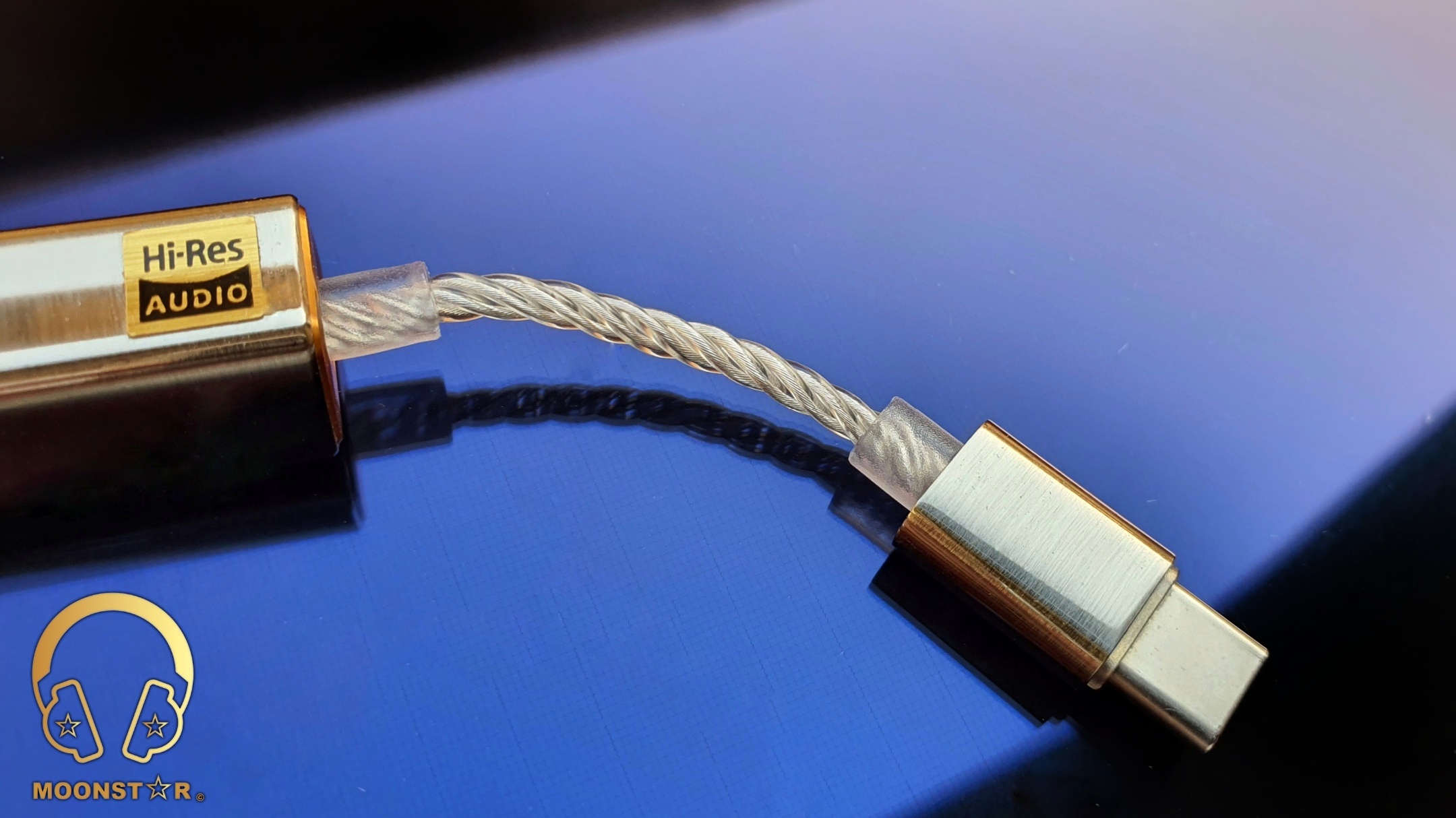
Midrange:
The iBasso DC04 has mildly warm midrange tonality and shows an impressive sense of clarity, airiness and resolution. Both male and female vocals do sound pretty successful when I pair the DC04 with In-Ear Monitors like iBasso AM05 & IT01s and with headphones such like the Sivga Phoenix or iBasso SR2.
The lower midrange shows a pretty good level of depth and body, while the upper midrange is nicely pronounced for a nice sense of clarity and liveliness. The voices of Male vocals from Barry White and Isaac Hayes up to David Bowie and Elton John do have a good level depth, body and emotion.
Female voices on the do sound pretty clear, realistic and intimate especially with the IT01s and the SR2, when I do listen to vocals such like Aretha Franklin, Edith Piaf or Hayley Westenra due to the nicely pronounced upper midrange tuning.
Instruments on the other hand are pretty musical, do have in general a slightly warm than neutral tonality and are pretty transparent and detailed in its presentation. String instruments such like guitars do have a soft, slightly warmish and smooth presentation, while violins are reproduced in a fairly bright and controlled manner.

Upper Midrange & Treble:
The iBasso DC04 has fairly bright tonality with good sense of intensity and resolution. The transitions in this area are in general smooth and controlled, without to show any audible sibilance or harshness when I do listen to IEM’s like the iBasso AM05 or IT01s or to Headphones like the iBasso SR2 and Sivga Phoenix.
Instruments such like side flutes, violins and pianos or soprano female voices are nicely emphasized and detailed, and are also shown with a good level of upper midrange extension and clarity.
The iBasso DC04 offers a natural and pretty detailed overall treble presentation with efficient level of brightness and extension.
The lower treble region shows a good sense of clarity and definition when I do listen to instruments like cymbals, hi-hats and snare drums in metal music. The upper treble region of the iBasso DC04 is able to produce an efficient amount of airiness and sparkle when I do listen to strings, pianos or soprano voices such like Hayley Westenra or Sertap Erener.
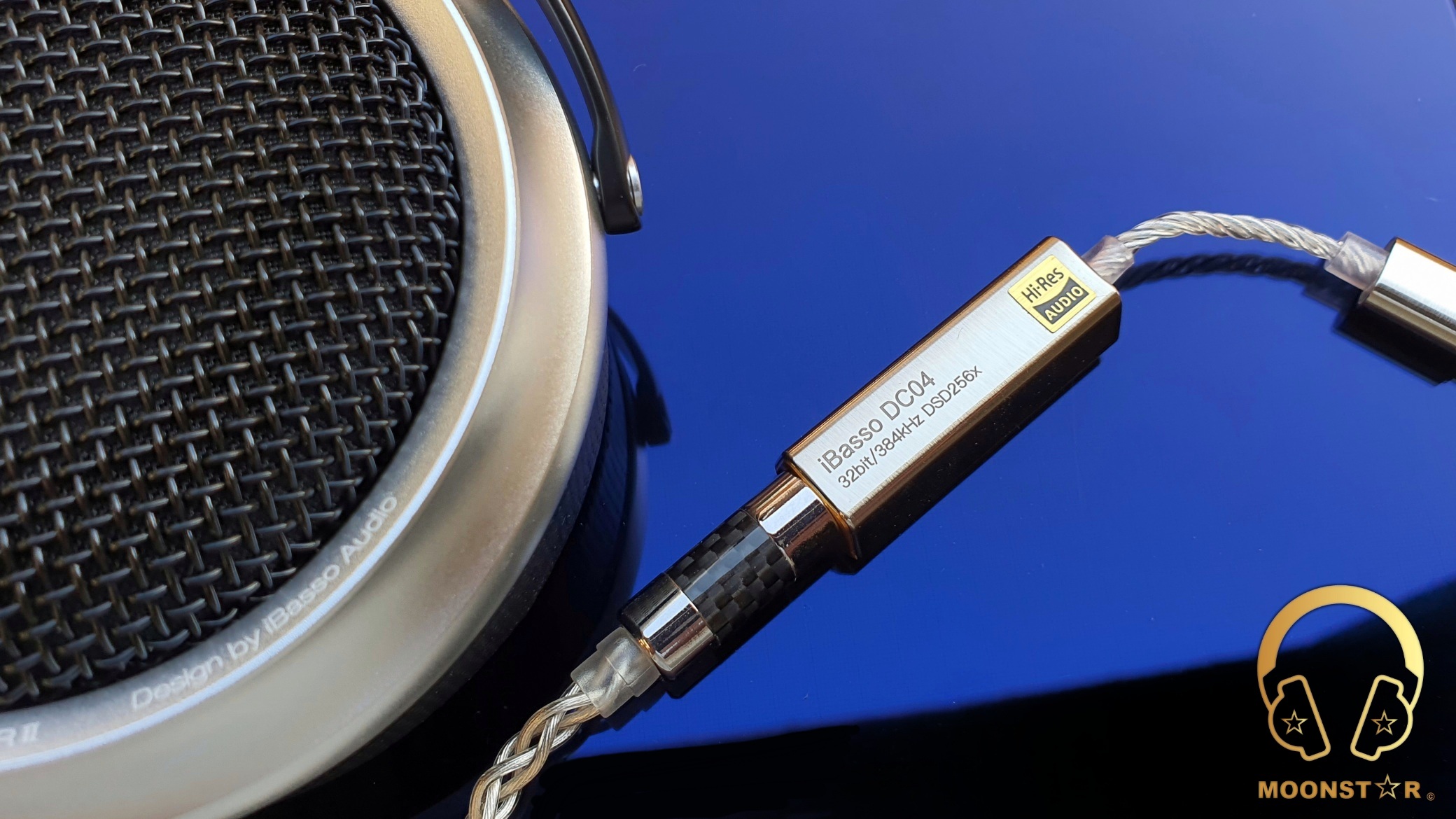
Soundstage & Imaging:
The iBasso DC04 offers a pretty expansive / spacious soundstage presentation that is suitable for a precise separation and placement of instruments and vocals. The stage shows an above average wideness and sense of airiness, while the depth is on a sufficient level for an ultra portable DAC/Amplifier, especially at this price range.
Comparison:
iBasso DC01 versus Musiland MU2
The iBasso DC04 and the Musiland MU2 are portable USB DAC/Amplifier dongles that do come with a fixed cable. The cable and the overall build quality of the DC04 is on a higher level, while the MU2 offers physical hardware volume buttons that the iBasso doesn’t have.
When it comes to the sound, I can say that the iBasso DC04 shows a more balanced overall presentation, with better sense of clarity and resolution. The bass of both devices is nicely pronounced, while the DC04 offers a better level of control, depth and extension especially in the midbass region.

The midrange of the Musiland MU2 shows a slightly warmer tonality with good amount of clarity and lower midrange depth. However, the iBasso DC04 is superior in terms transparency, airiness and overall detail retrieval in this area. The lower midrange region of the MU2 is slightly more emphasized that gives it the slightly edge with male vocals and instruments like violas and acoustic guitars. The upper midrange of the DC04 sounds more natural and realistic especially when I do listen to pianos or violins.
The treble range of both devices shows a pretty good performance in terms of control, definition and extension, while the iBasso DC04 has the upper hand when it comes to the separation, airiness and sparkle that is produced in this area.
The soundstage of both the MU2 and the DC04 shows a great soundstage performance for USB dongles especially at this price level. The iBasso DC04 has the upper hand in terms of soundstage wideness and airiness, while the Musiland MU2 has an slightly advantage when it comes to the depth of the stage.
Conclusion:
The iBasso DC04 is a very good example of how far the performance of such Ultra Portable USB sound devices has come in the last few years. It is the ideal solution for any Mobile Phone, Tablet and/or PC that do have in general a poor sound quality and amplification. The DC04 offers a very balanced sound signature along with a good sense of overall sound quality. Moreover, the 4.4mm Balanced Output it is very power, while it still has an ultra low noise floor, which makes it definitely to a no brainer especially for such an affordable price.
Pros and Cons:
- + Natural and Balanced Sound Signature
- + Overall Clarity, Resolution and Control
- + Powerful and Very Clean 4.4mm Balanced Output
- + 256x Native DSD Support
- + Build Quality
- + High value for the price
- – It has really no remarkable cons for such an affordable price
Thank you for the Read!



